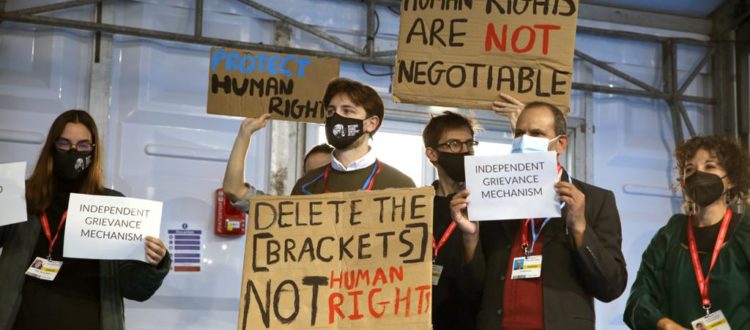HUMAN RIGHTS AT COP26: UPDATES FROM THE NEGOTIATIONS
The UN climate negotiations are not only about climate, but also about human rights, key to ensuring that people and the environment are not sacrificed in the name of emissions reductions. Chiara Soletti, Policy Advisor and Coordinator of the Climate and Rights section, reports on the situation at COP26 in Glasgow.
ACE
Action for Climate Empowerment (ACE) is an initiative foreseen by Article 12 of the Paris Agreement, with the objective of enabling all members of society to engage in climate action through education, training, public awareness, and international cooperation on these issues.
ACE has seen extensive civil society involvement over the years and is one of the UNFCCC programs that was not slowed down by the negotiating process. During its development, there have usually been no problems in the integration of principles related to human rights, as it was not a point of controversy in the negotiations (it is difficult to find a country Party opposed to climate education and awareness of climate action). For these reasons, the conclusion of the work on this text surprised many as all references to human rights were deleted, despite the fact that the previous drafts mentioned the need to keep a gender-, intergenerational- and human rights-based approach within the program.
During the first week of COP26, it was difficult for civil society observers to participate in the works over this program. The Parties’ decision to work in an “informal” manner, i.e. without the presence of observers, and the apparent security reasons related to COVID, which often require civil society to be left out of the negotiation rooms, contributed to the approval of a “weakened” text compared to the text inherited from the Madrid negotiations. The end result was influenced by Saudi Arabia’s pressure to remove all references to human rights. This, in combination with participatory difficulties, pressure from the COP Presidency to finalize the text, and lack of commitment from many delegations, resulted in this unexpected turn of events for ACE.
On Saturday, during the SBI plenary, 13 country Parties took the floor to acknowledge and apologize for the lack of mention of human rights, but no Party asked to reopen the text.
Article 6
The case of the ACE demonstrates how delicate the final stages of approval and adoption of a text are, raising concerns for the discussion of Carbon Markets under Article 6 of the Paris Agreement
Article 6 foresees the creation of a market dedicated to the commercialization of permits to emit specific quotas of greenhouse gases, allowing the purchase in order to encourage or help countries and companies to limit their emissions.
The texts dedicated to this article currently contains references to human rights and the rights of indigenous peoples. This is certainly positive, but as Parties try to compromise to finalize the rules, the risk remains that these will be removed. Having international carbon markets in place without precise references to human rights could lead, in the name of reducing emissions, to solutions that are harmful to people and ecosystems. This is in addition to the problems of emissions account i.e. how to make sure that they are measured in every country using the same techniques, ensuring accuracy and avoiding duplication in their counting; and the outstanding problem of how to deal with the emission allowances inherited from the Kyoto Protocol.
Week 2 negotiations are in turmoil, and civil society is mobilizing to keep pressuring on what is a critical issue in maintaining the integrity of the Paris Agreement
Loss and Damage
During COP19, held in Warsaw, Poland, an international mechanism was established to manage the loss and damage associated with the impacts of climate change, in low- and middle-income countries, those most vulnerable to this phenomenon. The weakness of the mechanism has been the lack of accurate forecasting to create a flow of funds and technology transfer adequate to support the difficulties of these countries.
The problem remains, and is reflected in the draft decision on the Executive Committee (ExCom) report of the mechanism released during the first week of negotiations, with no elaboration on how to provide funding. Parties are now divided between those that want more references to a potential financial mechanism, and others that want to minimize such references and discuss the details at a later date.
Civil society is also pushing to improve the text through the establishment by 2025 of a process of financial support to the most affected countries and a focus on the historical responsibilities of the most industrialized countries, mostly responsible for current climate change.
Chiara Soletti, Policy Advisor and Coordinator of the Climate & Human Rights Department

